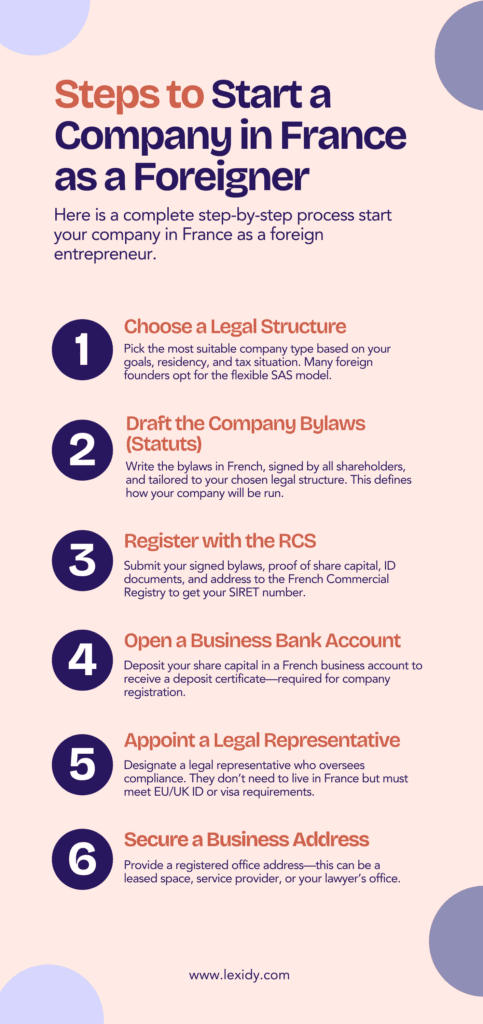Thinking of starting a business in France? You’re not alone. With its skilled workforce, pro-innovation policies, and access to the EU market, France is one of Europe’s top destinations for entrepreneurs. But before launching your venture, there’s a crucial first step: understanding the types of companies in France and choosing the right one for your business goals.
France offers several legal structures, each with its own setup process, tax obligations, and liability considerations. Whether you’re a solo founder, launching a startup, or expanding your international footprint, selecting the right entity is key to long-term success.
In this blog, you’ll get a clear breakdown of the most common types of companies in France, what sets them apart, and how to decide which one fits your needs
Table of Contents
- Why Legal Structure Matters When Starting a Business in France
- Main Types of French Companies Explained
- How to Choose the Right Business Structure in France as a Foreign Founder
- Steps to Set Up a Company in France as a Foreigner
- How Lexidy Supports Foreign Entrepreneurs
- Frequently Asked Questions About the Types of Companies in France
- How Lexidy Can Support Your Company Formation in France
Why Legal Structure Matters When Starting a Business in France

Choosing the right type of company in France directly impacts your taxes, liability, access to funding, and how your business can grow. In France, each business type comes with its own legal and financial implications. For this reason, it’s critical to understand what’s at stake before registering your company.
Key Differences Between Business Structures in France
There exists a range of business structures in France, from sole proprietorships to corporations. Some are suited for one-person startups, while others are designed for larger operations or companies with shareholders. The main differences usually fall into three areas:
- Taxation: Some entities (like a Société à Responsabilité Limitée – SARL or Société par actions simplifiée – SAS ) are taxed at the corporate level, while others (like sole traders) may be taxed as personal income.
- Liability: Certain structures protect your personal assets (e.g., SAS or SARL), while others leave you personally responsible for business debts.
- Capital Requirements: Some company types have no minimum capital, while others may require you to invest upfront.
For Foreigners: Bureaucracy & Language Barriers
Many foreign entrepreneurs underestimate the administrative complexity involved. From registering your company with the French Commercial Court (Greffe) to understanding local tax codes and employment laws, the process can be time-consuming without local support. Another barrier is language. Most forms and communications are in French, which can lead to delays or costly mistakes if misunderstood.
This is why choosing the type of company in France and getting the right guidance early on can save you time, reduce legal risk, and help your business start strong. Want to avoid costly mistakes? Get legal clarity on French legal entities.
Main Types of French Companies Explained
France offers a diverse range of business structures to meet the needs of different founders, from solo entrepreneurs to international corporations. Below, we have provided a breakdown of the most common types of companies in France, including their pros, cons, and ideal use cases.
Sole Proprietorship (Entreprise Individuelle)
The Entreprise Individuelle (EI) is the simplest type of company in France. It requires no separate legal entity, making setup and management relatively easy.
| Pros of Entreprise Individuelle | Cons of Entreprise Individuelle |
| – Quick and inexpensive to set up. – Minimal paperwork and accounting. – No minimum capital required. | – No legal distinction between personal and business assets (unlimited liability). – Harder to scale or attract investors. – Limited tax optimization options. |
Who should consider Entreprise Individuelle
EI is ideal for freelancers, solo consultants, and small local service providers who want to test the waters before incorporating a company.
SARL (Société à Responsabilité Limitée)
A SARL is a private limited company typically used by small to medium-sized businesses (SMEs).
| Pros of SARL | Cons of SARL |
| – Limited liability for shareholders. – Suitable for family-run businesses. – Straightforward governance model. – No minimum capital (just €1 nominally). | – More rigid structure compared to SAS. – Less flexibility in profit distribution. |
Who should consider SARL
SARL is popular among family-owned or traditional businesses that want liability protection and a formal legal presence in France.
SAS (Société par Actions Simplifiée)
The SAS is a simplified joint-stock company offering maximum flexibility in governance and shareholding structure, particularly favored by foreign investors and startups.
| Pros of SAS | Cons of SAS |
| – Highly flexible governance. – Shareholders have limited liability. – Easier to onboard new investors or co-founders. – No minimum capital (just €1 nominally). | – More complex to draft articles of association. – Requires legal and tax advice to structure properly. -Slightly higher admin costs than SARL. |
Who should consider SAS
Ideal for startups, tech companies, and international entrepreneurs who plan to scale, raise capital, or work with multiple shareholders.
SA (Société Anonyme)
The Société Anonyme is a joint-stock company designed for large businesses with significant capital and many shareholders.
| Pros of Société Anonyme | Cons of Société Anonyme |
| – Suitable for publicly traded companies. – Allows for issuing shares on the stock market. – Strong corporate structure and reputation. | – Minimum capital of €37,000. – Requires at least two shareholders and a board of directors. – Higher regulatory burden. |
Who should consider SA:
Best for established enterprises or businesses planning to go public or attract institutional investors.
Branch vs Subsidiary
Foreign companies expanding into France can either set up a branch office (succursale) or a subsidiary (filiale). A branch is an extension of the parent company, while a subsidiary is a separate legal entity.
| Company Type | Pros | Cons |
| Branch | – Simpler and quicker to establish. – No separate legal identity. – Profits flow directly to the parent company. | – Parent company bears full liability. – Limited operational independence. – If the branch representative does not have a French address, a representative in France must be appointed to fulfil tax obligations in France (corporate tax, VAT). |
| Subsidiary | – Full legal separation from the parent company. – Limited liability. – More credibility with local partners. | – More complex to establish and maintain. – Subject to local corporate taxes. |
Who should consider a Branch or Subsidiary:
A branch is suited for testing the French market or short-term operations. A subsidiary is better for long-term expansion with local hiring and contracts.
Need help choosing the right business structure in France? Let our legal team guide you through each step
How to Choose the Right Business Structure in France as a Foreign Founder

Choosing the right type of company in France is a strategic decision that impacts your legal responsibilities, tax burden, operational flexibility, and long-term scalability. For foreign entrepreneurs, the decision often depends on a mix of practical and legal factors:
1. Number of Shareholders
If you’re starting out solo, a Sole Proprietorship (EI) or a single-person SAS (SASU) / SARL (EURL) may suffice. On the other hand, if you’re launching with a co-founder, investor, or business partner, SARL and SAS are more appropriate, with SAS offering more flexibility in ownership distribution and governance.
2. Capital Requirements
France has eliminated high capital barriers for most structures, but some still apply:
- SAS and SARL: Can start with just €1 nominal capital.
- SA: Requires at least €37,000 in capital.
For foreign founders who want credibility with local partners or banks, starting with a more substantial capital contribution may be advantageous, even if the legal minimum is not a large amount.
3. Tax Implications
- Sole Proprietorships are taxed under personal income tax. This means your profit grows, the burden grows larger.
- SARLs and SAS are typically taxed under corporate tax (Impôt sur les Sociétés), with the option for smaller SARLs to opt into personal taxation under specific conditions.
- SAS generally allows for more tax planning flexibility.
4. When SAS is Better Than SARL
Let’s say you’re an international founder launching a tech startup in Paris with plans to raise venture capital. In this case, a SAS is typically more suitable than a SARL because:
- It offers greater freedom in designing share classes and profit-sharing mechanisms.
- It’s more familiar to investors and easier to scale.
- There’s no cap on the number of shareholders or strict board governance rules.
While it’s difficult to define the “right structure”, the best structure for your needs should balance flexibility, liability protection, tax efficiency, and compliance. If in doubt, consulting a local legal expert is essential, especially when navigating France’s business and immigration systems. Fill out the form below to get a free consultation.
Steps to Set Up a Company in France as a Foreigner

Setting up a company in France as a foreign entrepreneur involves a number of administrative and legal steps. The bureaucracy can feel complex, especially when there are language barriers involved. However, with professional guidance, the process is structured and predictable. Here’s a breakdown of the key stages:
1. Choose a Legal Structure
Your first step is deciding on the most suitable type of company in France based on your goals, number of partners, tax situation, and residency status. For many foreign founders, the SAS (Société par Actions Simplifiée) is the go-to structure due to its flexibility and compatibility with international ownership.
2. Draft the Company Bylaws (Statuts)
Your bylaws must outline the company’s rules of operation, shareholder roles, and governance model. These must be:
- Written in French (this is an official requirement).
- Signed by all shareholders.
- Aligned with the chosen legal structure (e.g., SAS vs SARL).
Professional legal assistance is strongly recommended here to avoid issues with tax authorities or banks.
3. Register with the RCS (Registre du Commerce et des Sociétés)
Next, you must register your business with the French Commercial Court Registry. This grants your particular type of company in France a SIRET number (the French business ID) and official legal status. This process involves submitting:
- Signed bylaws.
- Proof of share capital deposit.
- Identity documents of the founders.
- Lease or business address documentation.
4. Open a French Business Bank Account
Before you can finalize your registration, you’ll need to open a professional bank account in France to deposit the initial share capital. Once this has been deposited, the bank will issue a certificate of deposit, which is required for the RCS filing.
Some banks may require a French address or representative; however, online and international-friendly options are increasingly common for accommodating foreign founders.
5. Appoint a Legal Representative
Every French company must designate a legal representative (représentant légal) who is responsible for the company’s compliance. This person:
- Does not need to be a French resident but needs to have a French, European Union or UK identity card/passport. Otherwise, any non-EU or non-UK national must have a visa allowing them to perform management duties in France.
- Can be a founder, manager, or an appointed third party.
This makes it easier for foreign shareholders to retain control without needing to relocate immediately.
6. Secure a Business Address
You must provide a registered office address (domiciliation) for your company. Options include:
- A leased office or coworking space.
- A domiciliation service provider.
- A legal address provided by a professional (e.g., your lawyer or accountant).
- Your own personal address if you relocate to France.
This address will appear on all official documents and must remain valid throughout the company’s life.
With these steps completed, your company will be legally established and ready to operate in France. While it’s true that you can complete the process on your own, foreign founders often benefit from expert legal guidance, especially when navigating language barriers and ensuring full compliance from day one.
For a step-by-step overview of what to expect, read our roadmap to starting a business France as a foreigner.
How Lexidy Supports Foreign Entrepreneurs
Launching a business in France can be a strategic move. For foreign founders, navigating French bureaucracy, legal structures, and language requirements often poses a real challenge. That’s where Lexidy steps in.
End-to-End Company Formation Services
Lexidy helps foreign entrepreneurs establish their French company from the ground up. Our legal team assists with:
- Choosing the optimal type of company in France (SAS, SARL, etc.).
- Drafting and translating your bylaws.
- Registering with the RCS.
- Coordinating with banks and tax authorities.
We manage the entire setup process so you can focus on building your business.
International Founder Expertise
We specialize in working with non-residents, digital nomads, expats, and international investors. Whether you’re launching a startup, opening a branch, or expanding into France, our multilingual team ensures your business is fully compliant and properly structured from day one.
Ongoing Corporate Legal Support
Beyond incorporation, Lexidy supports your company’s growth with:
- Shareholder agreements and structural changes.
- Business contracts and compliance checks.
- VAT registration and tax representation.
We remain your long-term legal partner, helping you stay ahead of French regulations.
Simplifying French Bureaucracy for Global Founders
From choosing the right business structure in France to securing your SIRET number, Lexidy translates complex French processes into clear, actionable steps tailored to your goals.
Frequently Asked Questions About the Types of Companies in France

Can I own a French company without living in France?
Yes, non-residents can own and even manage a French company. While local representation is required in some cases (for non-EU or non-UK residents), residency is not a prerequisite for ownership.
What’s the best type of company in France for a startup?
The SAS (Société par Actions Simplifiée) is often ideal for startups due to its flexible structure, easy share transfer rules, and suitability for raising capital.
How much capital do I need?
It depends on the structure. An SAS or SARL can be created with as little as €1, though higher capital is recommended for credibility and operations. An SA requires at least €37,000.
What’s the easiest business structure in France for a solo founder?
A Sole Proprietorship (Entreprise Individuelle) is the simplest, but it involves personal liability. If you want limited liability, an SASU (single-person SAS) or a SARL (EURL) is a better fit.
How long does company formation in France take?
Typically, 1 month, depending on your preparedness, structure chosen, and how quickly documents like bylaws and proof of address are submitted.
How Lexidy Can Support Your Company Formation in France
Choosing the right type of company in France is a foundational step in launching a successful business. From tax treatment and liability to shareholder flexibility and capital requirements, your legal entity will shape how your business grows and how easily you to navigate French bureaucracy.
At Lexidy, we specialize in helping foreign entrepreneurs and international founders confidently enter the French market. Whether you’re launching a tech startup or opening a European branch, our bilingual legal experts handle every step, from company formation to ongoing compliance.
Ready to make your next business move? Our corporate lawyers in France are here to help. Fill out the form below to get started!

